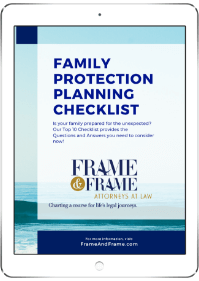If you were appointed as a personal representative or named as executor in a Will, you probably have many questions about how probate works in Maryland. There are specific provisions and requirements that apply to the decedent’s real estate, but a multitude of factors determine exactly how this type of asset is treated by the probate court in Maryland.
Our Maryland probate attorneys at Frame & Frame can assist you throughout the process, including advising you on handling the deceased individual’s real estate. Please contact our office to speak with a member of our team.
Overview of the Probate Process
In probate, real estate owned by the decedent is governed by the terms and condition in the Will, unless it is owned jointly with another person. If there is no Will, the Maryland laws of intestacyapply. This can pose problems if the decedent was married, divorced, then remarried and children from either marriage exist. Because state law does not address the complicated issue of blended families with children, inheritance surprises may occur during probate if there was no Will or if the Will was deemed by the probate court to be invalid.
Titles to Real Estate Holdings
The second consideration for real estate in the probate process is whether the asset is part of the decedent’s estate. Real estate can be held through different types of ownership under the laws of property, so there are four key terms to understand, as listed below. Therefore, as executor or personal representative, you would be concerned only with real estate if it is titled under 3 or 4 below.
- Tenants by the Entirety: This form of real estate ownership exists between a married couple. When one spouse dies, the other takes title as the survivor.
- Joint Tenants with Right of Survivorship: A similar form of ownership, title also passes to a surviving co-owner upon the death of another. It is not required that the co-owners be married, and there may be more than two co-owners.
- Tenants in Common: When a co-owner dies, his or her share must go through the probate process in order to transfer the property share to the decedent’s heirs.
- Sole Ownership: If there is only one owner or all previous co-owners have died, the real estate becomes part of the probate estate.
Managing Property During the Probate Process
As the person in charge of the estate being probated, it is your responsibility to manage real estate in a prudent, responsible manner and avoid causing waste. This may mean collecting rents from tenants – even if the tenants are family members, and other duties such as maintenance and tenant relations.
Selling Real Estate in Probate
Eventually, it may become necessary to dispose of the decedent’s real estate. If the property is subject to a specific bequest in the Will, you will make the arrangements to transfer it to the named heir. The exception may be selling it to satisfy debts of the decedent. When the property is in a probate process with no Will, you would likely sell the property and distribute the net proceeds to heirs after paying off creditors.
Discuss Real Estate Issues with a Maryland Probate Lawyer
If you would like more information on real estate as it relates to the probate process, please contact Frame & Frame to schedule a consultation. We can answer your questions and assist with a wide range of legal issues. With offices in Pasadena and Stevensville, we serve communities Maryland.






